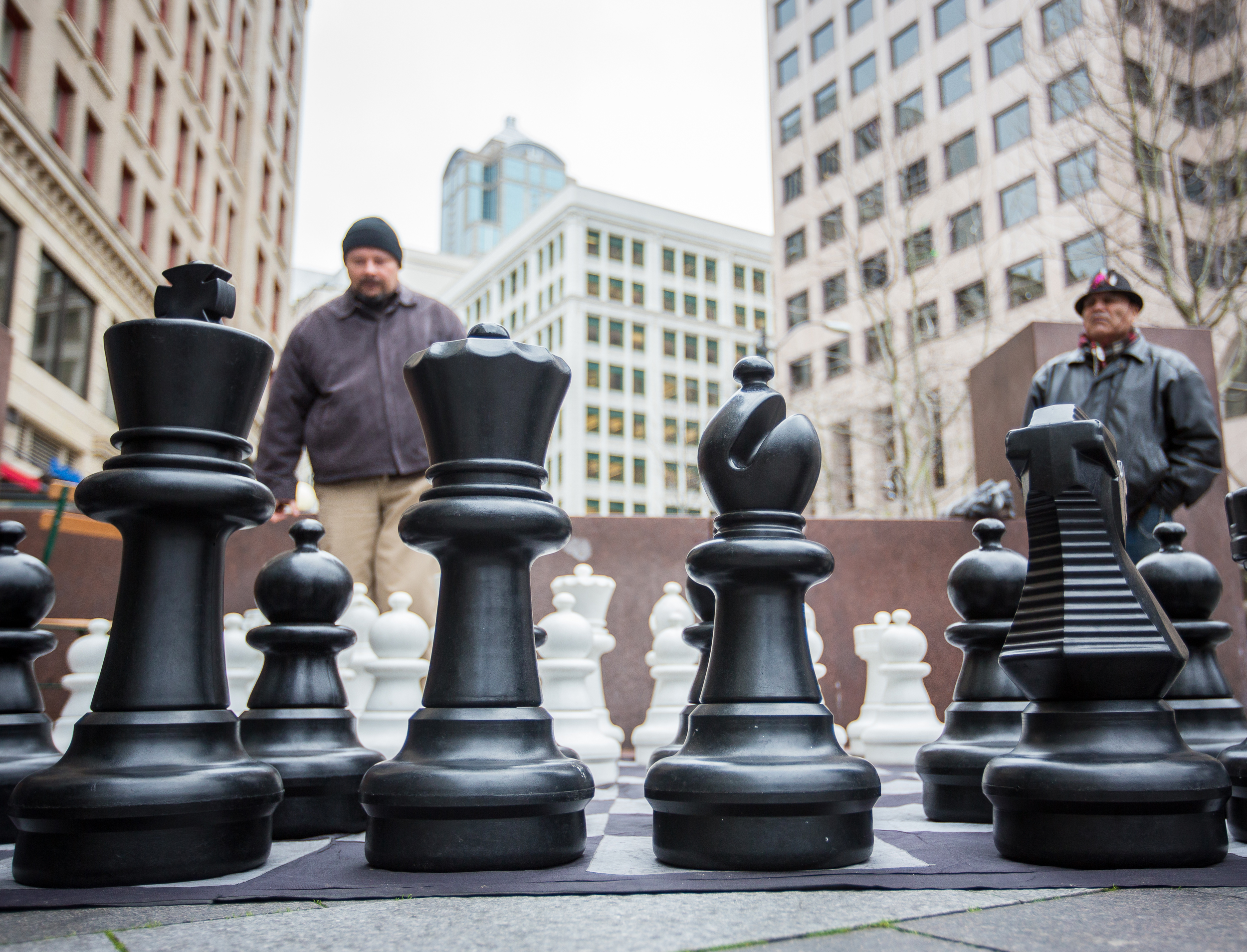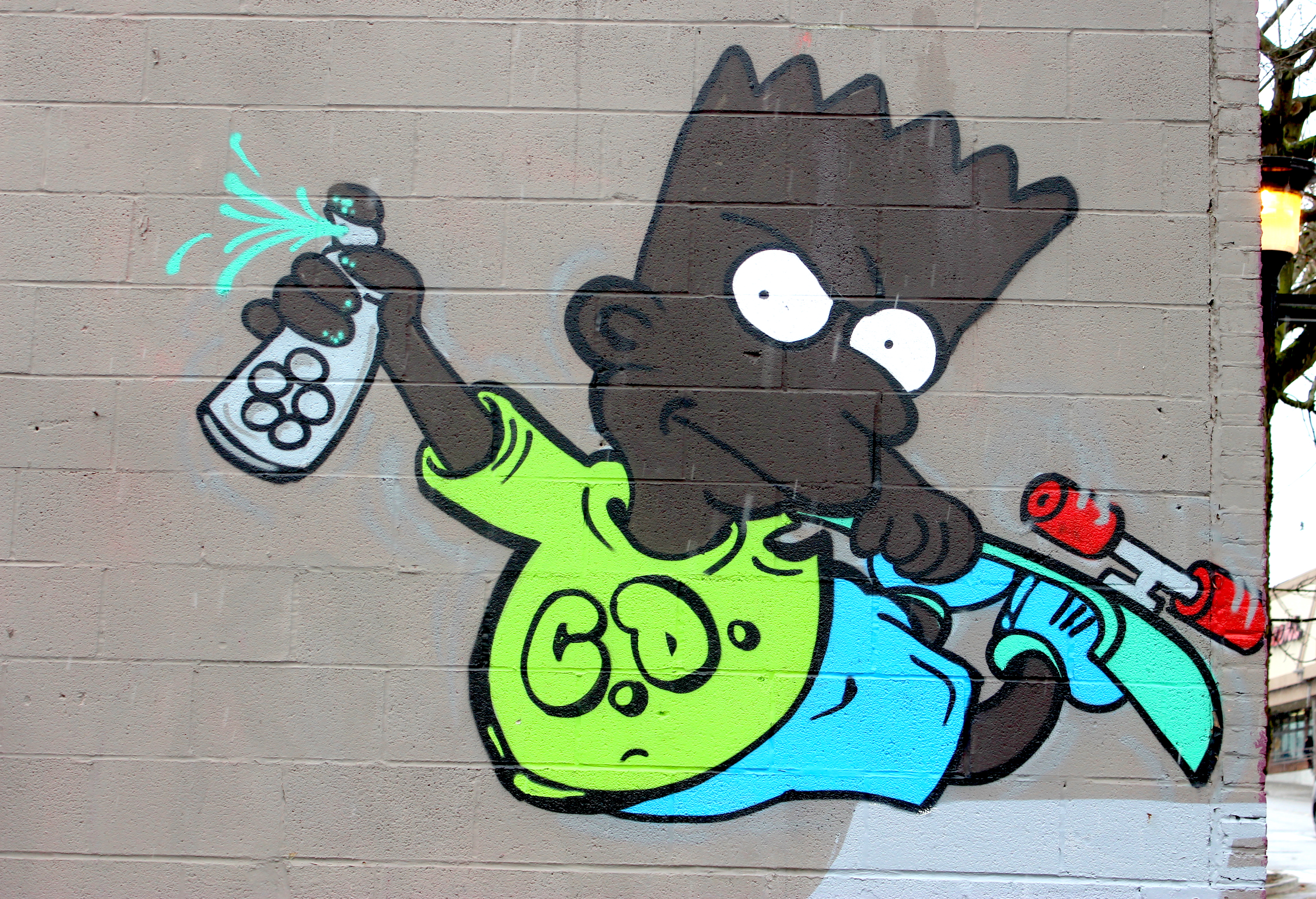Above: Evol “Evil” Wilson and JoJo, AKA “David Carradine” go head to head.
It
’s the end of the opening phase when a pungent man with a skateboard sits down next to the large outdoor chess board at Westlake Park and slowly starts to roll a joint.
Not many people notice—most in the large crowd are thoroughly engrossed in the game happening on the ground in front of them. Finished with his prep work, the fragrant man takes out his lighter, burns the joint, inhales and then exhales a cloud of pot smoke. With the dank smell of marijuana floating through the air, the crowd finally looks up.
“Hey, man,” one of the chess players says. “I can’t focus if I’m getting contact high.” Westlake street chess etiquette, it turns out, dictates a strict “No smoking stogies or joints near gameplay” policy.
After a bout of indignant grumbling, the man with the joint moves over and sits on the ledge by the concrete park’s water fountain to finish.
Gameplay resumes.
For most Seattleites, Westlake Park is not a place to play games. It is a place where activists go to scream into a megaphone, or where homeless people go to scream at passersby. It is a place where tourists board the Ride the Ducks trucks to gawk at “Pike’s Place” and honk plastic duck whistles at people on the street.
It’s not the most happening place.
In 1999, it sort of was, but only because the park turned into a convenient place for police to round up 200 protesters for a mass arrest during the WTO riots. In 2012 the park got its own Facebook page, “Seattle Westlake Park Drug Dealers,” where people have since posted pictures of mostly shirtless gang-bangers in the area. A year later, a Seattle Police Department undercover investigation in the park resulted in 31 arrests for gang activity and cocaine peddling. But there have been efforts to turn around this park and the rest of the downtown core. Last year then-mayor Mike McGinn created the City Center Initiative, to try to get downtown businesses, social services, and other “stakeholders” to talk to each other about how to clean up the area, but progress is slow, and, with a new mayor in City Hall, the program is now in limbo. So Westlake Park remains a sort of no-man’s land—aside from one 64˝ x 64˝ square mat where order, more or less, is strictly maintained.
In 2007, Victoria Schoenburg’s unit in Seattle’s Parks and Recreation department was put in charge of an initiative to put “positive activities” in downtown parks. For 15 years, until 1986, Schoenburg had lived in New York, where, she recalls,she would stroll through Washington Square and Greenwich Village among the wonderful scenes of people playing chess. So she decided to slap down some giant chess mats in Seattle to see what would happen.
“We did not anticipate the chess mats downtown would be as popular as they’ve become,” she says. “We have to warn people the parks are closing and that they can’t start another game. There are lines of people that form around these things.”
To date, Seattle Parks and Recreation has put chess mats in four parks: Westlake, Occidental, and Hing Hay year-round, as well as one in Freeway Park during summers. Seattle has spent an estimated $5,110 buying the mats, replacing those that get worn out, and buying new pieces when old ones break. All things considered, it’s a minimal sum to pay for something that is slowly turning parks known for crack deals into pockets for supportive communities—places where anybody can come to learn how to be a decent strategist or make a few unlikely friends, as long as they are willing to keep their pot smoke to themselves.
In the seven years since Schoenburg decided chess might be a good idea for Westlake, an enormously diverse community has sprung up there—shouting, laughing, and scheming around one medium-sized piece of tarp with some black and white squares printed on it.
Construction workers, artists, immigrants, retirees, stoners, bankers, coders, the homeless, and hotshot millionaires alike all regularly make their way to the chess mats to match wits and talk smack. When the weather gets really bad, they head to Seattle Center to play on the giant chess board at the Armory—but a simple cold winter day won’t deter them from Westlake’s rough-and-tumble chess charms. You can probably find them out there right now.
And while much of the time the people playing chess end up shouting at each other just like they did before the game appeared in the park, Schoenburg’s goal of bringing some positivity to Westlake has succeeded. These are the stories of the vibrant street chess chums whose lives have become intertwined with that tarp Schoenburg laid down seven years ago.
Kings, Queens, and Transients
Above: John “The Champ” Henderson. Photo by Ashwin Rao.
“I’ve made all sorts of friends out here,” John Henderson says in his thick Scottish brogue. The bespectacled older gentleman is prone to fits of laughter and punny, idiom-laden jokes. “One of my good friends who comes down here to play is actually a multimillionaire,” he says.
That friend—a man who always wears shades and often holds a cup of coffee—is notoriously enigmatic among the chess community here. He changes his name each time you ask. I got “Caligula” when I asked.
Another friend Henderson met here at Westlake, Peter Kinev, grew up in the Soviet Union. As a child he was sent to a Soviet chess school because of his advanced skills. Now he works as a coder, using the cognitive and organizational skills he picked up playing the game to create complex web systems, including one used by the U.S. Census. Kinev, now grey-haired and a little bent over, speaks in a heavy accent when he praises Henderson’s chess skills.
“He’s very, very good,” Kinev says, patting Henderson on the back. “He’s on a whole different level, this man over here. It’s no use trying to play him really.”
Many people here at Westlake sing Henderson’s praises. He’s here most of the time, just standing back and watching the games—something he’s accustomed to here and in his job as an international chess correspondent for The Scotsman, Scotland’s national newspaper. Henderson claims he sees somewhere around 1,000 chess games a week, whether online, on TV, at tournaments, or at Westlake.
“When you see as many chess games as I do, the strategy just becomes sort of second nature, I suppose,” he says.
With all the world-class games he watches, all the strategy books he’s read and reviewed, and his 263-game winning streak, Henderson has earned the nickname “The Champ” among the Westlake chess community, where many mistakenly assume he’s a grandmaster, the highest honor bestowed upon a player by the World Chess Federation.
“The Champ” spends his time at the park acting something like Westlake’s unofficial chess teacher. Most people here seek him for post-game critiques, advice on strategy, or insights into positioning. A nearby banker recently spent time with him learning openings.
In many ways, Henderson’s educational streak carries on the legacy of the very first chess friend he made in Seattle—the friend who ended up convincing him to leave the rolling highlands of Scotland for Seattle.
Just three blocks from the Westlake chess set sit the Royal Crest Condos, the former home of chess grandmaster Yasser Seirawan, indisputably one of the best players Seattle has ever seen. As a child, his family fled Syria during the country’s 1966 coup, settling here thanks to a Boeing computer-programming job his father landed. At 12, Yasser began learning the ins and outs of chess from David Chapman, the paralyzed ex-college-football player living upstairs in his family’s Central District apartment building. At 13, he became the Washington Junior Champion. In the early ’70s, as a student, he formed Garfield High School’s first chess club, which continues to this day.
The nascent team went on a warpath, sweeping all three possible state titles two years in a row. Seirawan moved on to international chess success, but not before dominating the U.S. Chess Championships, winning the title four times and establishing himself as the country’s best player throughout the ’80s and ’90s. A 1981 Sports Illustrated profile (“Yasser, That’s My Baby”) detailed the events that led to Seirawan’s early international success at the Tata Steel Chess Tournament in the Netherlands, where he beat Russian grandmaster Viktor Korchnoi at the ripe age of 19—just three years after starting Garfield’s chess club.
Between 2000 and 2003, Seirawan went on to save the U.S. Championships from financial hardship by sponsoring and moving the games to Seattle through his Seattle Chess Foundation, a non-profit that uses chess in the classroom to educate kids. He even challenged convention by having men and women compete against each other in the Championships for the first time.
In 2002 he invited John Henderson to pack his bags, move out of Scotland, and become the press officer for the games. Henderson gladly accepted, and the two became close friends.
Henderson came partially based on the work being done by Seirawan’s Seattle Chess Foundation. “It’s just a simple board game, but they’ve found that it helps kids with learning disabilities start concentrating,” Henderson says now.
Seirawan attested to that himself in the Sports Illustrated profile. “Like all kids, I had tremendous energy drives. I’d run up and down hills and valleys, and then climb a tree and eat a rock. Suddenly I was forced to focus all my energies on the board.”
The non-profit Seirawan helped start, now based in Bellevue, has since turned into America’s Foundation for Chess, spreading the game throughout second- and third-grade classrooms across the country to help kids develop cognitive skills. Seirawan lives in the Netherlands now, lured by his Dutch wife’s cushy job there and the county’s guaranteed rent control, but Henderson is helping to keep his legacy alive at Westlake.
“Chess can be an equalizer,” Kinev says, standing next to Henderson. “Many of the homeless people who come play here are quite good. They spend their time learning, sometimes from John, sometimes themselves. It’s not unusual that a homeless person will beat you.”
“That’s what’s great about it,” Henderson adds. “There aren’t any social boundaries in street chess like this. Homeless people come play my millionaire friend, and it’s true that many of them are very good.”
Henderson has played a number of the homeless people who come to the Westlake chess mat, offering them a coffee after the match. He says they will sit and talk to him about chess, wandering off into different spheres of conversation—how they’re doing, how hard their lives are.
“It became obvious after the banking crash that more people were living rough in Seattle,” Henderson says. “I noticed more homeless people coming by the set right after then, just congregating and passing the time, watching, playing.”
So Henderson did what he always did—once he got to know them, he offered his tips and tricks, never asking about their living situation unless they brought it up. Gradually they got to know Henderson, and gradually they boosted their games.
“I think they were, and are, drawn to the chess mat because it gives them confidence in themselves,” Henderson says. He tells me he saw a former “pupil” up in the U District recently—a man he first met right after he was released from prison. He had learned chess in jail—“an outlier among his peers,” Henderson says, who spent most of his time studying.
“I ran into him and he told me he’s gotten things together and is moving to San Diego,” Henderson says. “Chess can really help you get focused—I mean, you go back to its origins and you’ll find out that the game started as a way to teach generals to organize their militaries. It was a war game.”
But now at Westlake, it’s helping people find peace. And in John Fox’s case, employment.
“I was sort of homeless by choice at the time,” Fox tells me.
The Sumner native had just finished hiking around the West Coast when he started coming to play chess at Westlake, between jobs and homes. People here call him “John the Terrible” because of his stint as a professional wrestler on TV. Promoters told him to use the name “Jason X,” riffing on the horror-movie classic. Fox would put on a hockey mask and overalls and get into the ring to bring the smackdown—earning a small following in Portland and Vancouver.
“I still find fans uploading videos of my matches,” he says, “I lost most my own videos in a flood.”
The competitive drive on display in his wrestling also buoyed his lifelong love of chess. When he was out of work and homeless, he started playing chess most days just to pass the time. He found friends here at Westlake—it became a sort of home itself. Eventually Seattle Parks employees took notice of his frequent visits and offered him a job at Westlake last May.
Now he puts out the chess set every morning and oversees Westlake as a full-time park concierge. “I guess you could say chess gave me a job.”
You Win Some, You Lose Lots
Above: Evol “Evil” Wilson. Photo by Joshua Bessex.
“You gotta go! Make a move already,” JoJo yells, trembling in his metal park chair and clutching his cane.
“YOU GONNA MOVE OR WHAT? YOU JUST GONNA TALK ALL DAY?”
Standing on the other side of the chess board, Evol Wilson grins.
According to Wilson, the folks at Westlake Park call him “Evil Wilson” because of this grin—but between me and you, I’ve never heard anyone but him use this nickname. He loves giving nicknames. He has one for everyone who plays chess down here: Ming the Toothless. Leo the Mexican Coyote. He coined “The Champ” for John Henderson. The list goes on.
“JoJo’s just trying to intimidate me,” Wilson whispers in my direction, cupping his hand to his mouth. “There are infinite options for your next move in chess, but there’s only one move you’re supposed to make. With JoJo, the key is taking your time to really find that move, because he’s gonna rush you and run out your patience.”
Wilson often does this—ruminating strategy aloud. It’s his second favorite thing to do, after handing out nicknames. He has one for JoJo too.
“I call him David Carradine,” Wilson whispers. “He’s like that guy in that TV show Kung Fu, swinging his cane around like a karate master or something.”
A number of people at Westlake back this up: The man loves to swing his cane in times of trouble. I’m told the police had to break up a fight between JoJo and another older man who’d bested him in a game at the park. When they arrived, they found the two shouting at each other, JoJo swatting his foe with his cane.
“They’ll never arrest him, though; he’s not really a threat to anyone,” Wilson says. “He’s just an old man.”
“HEY, YOU GOTTA HURRY UP, I GOT PEOPLE TO MEET!” JoJo screams, adjusting his fedora.
JoJo does seem like he’s got places to go. He’s tapping his cane on the cement like a madman.
Wilson grins again. More of Jojo’s bluffing, he says: “It’s all a lie.” Wilson finds it hard to believe the old man has anywhere to be but here—playing chess on the big outdoor mat as he’s done almost every day for two years. Wilson should know—he’s been here just as long, visiting when he’s not at his construction job or playing in his band. “We called ourselves the White Keys, because we are two black dudes. It’s like the opposite of the Black Keys.”
Things aren’t going so well for Wilson right now. He thinks he’s about to lose to JoJo. He tells me he knew he lost 20 minutes ago. He often loses here. Despite that, he keeps playing.
“Man, there’s definitely a pecking order here at Westlake,” he says. “The Champ is at the top, and I’m somewhere near the bottom, probably.”
This summer, a preteen girl came to the chess set and challenged Wilson. He lost, inspiring a chorus of mockery from his colleagues. When he tried to teach his girlfriend chess, they ended up breaking up after she alleged he was cheating (at the game, that is). Losing game after game against a friend at Westlake, Wilson finally won when his opponent agreed to play without a queen.
“Man, that’s the thing about street chess,” he says. “Between the cars, the crackheads, and the girls, it’s hard to keep focused sometimes. I mean, it’s Westlake—but I like that about this park.”
On cue, a woman starts screaming over and over to nobody in particular, “I HATE YOU I HATE YOU I HATE YOU!”
Wilson studies the chessboard until more screaming starts. This time it isn’t the homeless woman, but JoJo again. “HEY, MAN, I GOT PLACES TO BE—WE COULD HAVE BEEN DONE BY NOW IF YOU WEREN’T TELLING YOUR LIFE’S STORY!”
Ignoring his own advice not to let JoJo rush him, Wilson begins hastily moving his pieces, launching a flurry of messy captures.
JoJo takes a bishop.
Wilson takes a queen.
JoJo takes a queen with his pawn.
After the intense game development, Wilson sighs and shrugs. It’s becoming rapidly apparent that he really is losing.
Suddenly a man appears across the street and starts waving, yelling JoJo’s name.
“HEY, MAN, I GOTTA GO! I WIN!” JoJo says, darting across the street to meet his friend.
“Well,” Wilson says, “I guess he wasn’t lying about having someplace to go this time.”
For all the losing Wilson does, he keeps coming to Westlake. When he’s not there, he says he plays his friends on his phone, or on chess.com. He sort of likes to lose.
“Losing is hard,” he says. “It hurts, man, it’s painful. But it’s actually really good. You smart for 10 minutes, then you’re back up at it again and you’ve learned something. It’s like life, man. Chess here at this park, street chess, it’s just like life.”
God’s in the Game
Above: Jose Vargas. Photo by Joshua Bessex.
Jose Vargas is wearing a hat with a pink feather in it—a little showy, sure, but it’s a mark of how on-top-of-the-world he feels.
“I have a beautiful life,” he says in his rich Spanish accent. “I am near the end of my life, but I have beautiful life. Some people no believe me, but I really mean it.”
Vargas, 72, comes to Westlake almost every day to play or watch chess. It’s part of his retiree ritual.
“I have bus pass, $27 for four months. I come here to the city from my home in Tukwila. Then I go to the YMCA, maybe, steam room, hot pool, sauna, exercise. Then I go to the Chinese buffet. Big food. Then I come here to chess. I have beautiful friends here. I have good days here.”
Vargas says chess is a gift from God. It redeems him.
Sometimes, because of his age, he feels physically ill. Other times he wrestles with his psyche and self-doubt. He says that because he is older and Mexican, people often stereotype him as a criminal or homeless when he is out in the city, calling him names.
Whenever that happens, Vargas comes to Westlake and, he says, tries to connect with God through chess and the community here. He says it causes a warm feeling to wash over him, a feeling that makes him thankful.
“I was born in California, Ventura County. I smoke too much, drank too much, and lost my mind.” In California, Vargas’ friends fell into vice as well, an unhealthy environment that prompted his escape to Seattle. He went to Renton to earn a degree in welding, which he parlayed into a job assembling and repairing ships at the docks. It kept his mind off his addictions until he was forced to retire due to a work-related injury.
Vargas points to the chess set. “Here, I don’t smoke and drink. Here, I keep my mind. I remember that I have a mind.”
Chess isn’t about strategy for Vargas. He doesn’t even care to win. He says trying too hard and reading all the strategy books would only cause conflict. Too much winning and you start getting in fights with other people over the competition.
“Winning is no good. It’s no good being good. I don’t need it. You can feel it in your blood when people don’t like you because of the win,” Vargas says. “I do not like that feeling, I do not want people to be mad because of the game.”
He isn’t looking for conflict, just friendship and a bit of brainwork. Even simple, off-the-cuff games keep his head on straight: “It keeps me clear. It’s a beautiful thing. It helps my mind, the discipline does.”
Vargas takes his hat off and places it over his chest. “I found God and friends here. Before, I grew up in garbage cans, eating scraps,” he says.
Vargas points at the chess set again.
“Now I have everything.”
ksears@seattleweekly.com








